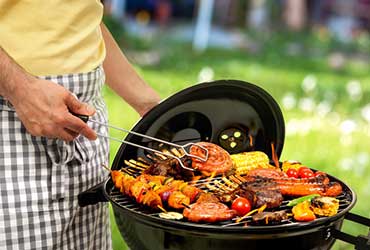The Heat is On: Healthy Tips for Grilling
As soon as the first steady rays of sun peak out, people seem to dust off their grills and cook al fresco. Even though the smell of grilled meats can be hard to resist, grilling can pose some dangers which are important to avoid. So, you may be asking yourself: What’s the safest (and tastiest) way to grill?
First, choose natural gas (or propane) over charcoal and even wood. Gas is a “cleaner” heat source and generally creates less secondary smoke. If you decide to grill with charcoal, briquets or real wood, use a “chimney starter” to speed up the burning process. Avoid chemical starter fluids --anything you add to those coals, ends up in whatever you’re cooking on the grill!
It's true that grilled foods are generally more healthy because they aren’t cooked in fatty oils or have any breaded coatings. But WHAT you cook on a grill is just as important for your health. Opt for vegetables, fruits and lean cuts of meat (in this order!). When grilling fish, wrap it in foil or cedar wraps –add flavor and maintain natural juices. Also, limit the amount of fatty sausages, meats and marinades because they either add calories and cholesterol or produce harmful carbons on the food surface in the form of PAHs and HCAs.
Polycyclic aromatic hydrocarbons (PAHs) and heterocyclic amines (HCAs)
Both of these grilling by-products are carcinogens have serious risks. PAHs are made by the fat, which drips and burns onto the hot coals or grill element. The hot flames and smoke which rise deposit the PAHs onto the food. So, anything that is “charbroiled”, crispy and black most likely contains PAHs too. HCAs form any time red meat, poultry and fish are cooked at high temperatures, ie grilling or broiling.
Luckily, veggies don’t generally produce these carcinogens and some marinates can help avoid them. Hearty, dense vegetables like onions, Bell peppers, Portobello mushrooms, green and yellow zucchini, tomatoes, corn cobs and eggplant are flavorful, colorful and recommended for grilling. Lemon juice and vinegar create a type of “healthy coating” that changes the acidity of the meat and prevents PAHs from attaching. Keep in mind any sugary sauce (think BBQ, ketchup, maple syrup and honey) promote the charbroiled effect. So, don’t add them until the end of grilling time (but no more than 1 or 2 minutes).
Another tip is to clean your grill after each use. This cuts down on burnt particles that cause smoke. Spray a bit of white vinegar on the rack and use half an onion (or a rough ball of aluminum foil) to scrape off the unwanted bits. Keep your grilling habits healthy and enjoy the time cooking in the great outdoors. Wear close fitting clothing and protect your skin by applying enough sunscreen!
Remember eating plenty of fresh fruits and vegetables has immeasurable benefits your body, adds variety to your diet, and can reduce your risk of coronary heart disease, stroke, obesity, and some types of cancer.

